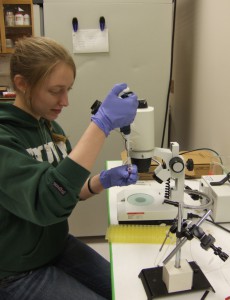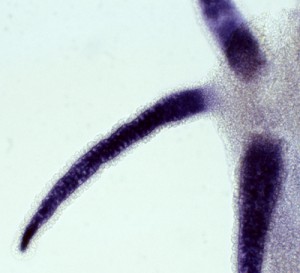Hydra species are morphologically simple invertebrates with relatively few identifiable cell types. My research group is currently using Hydra to study the biology of aging. Previous studies suggest that members of the species Hydra vulgaris can survive indefinitely without declines in health, while members of the species Hydra oligactis experience increasing physical deterioration and eventually death following reproduction. Interestingly, H. oligactis are also more sensitive than H. vulgaris to heat stress and other environmental stressors.

Stephanie Gingrich (class of 2012) preparing DNA for microinjection into hydra embryos
We are working to determine whether differences in the heat shock response can explain the extreme difference in lifespan between the species. Using approaches including analysis of gene expression, production of transgenic Hydra, and elimination of specific cell types, we are investigating the roles of several genes which could potentially be involved in maintaining Hydra stem cell populations and extending lifespan. In collaboration with the lab of Daniel Martinez at Pomona College, we are also using next-generation DNA sequencing techniques to identify genes involved in protecting cells from stress-induced damage. Our research is currently funded by grants from the National Institutes of Health and the Templeton Foundation. In the past, it has been funded by the National Science Foundation.
